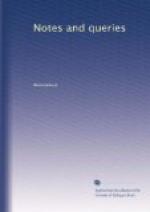Why may we not have the liberty of forming a plural noun news from the adjective new, though we have never used the singular new as a noun, when the French have indulged themselves with the plural noun of adjective formation, les nouvelles, without feeling themselves compelled to make une nouvelle a part of their language?
Why may we not form a plural noun news from new, to express the same idea which in Latin is expressed by nova, and in French by les nouvelles?
Why may not goods be a plural noun formed from the adjective good, exactly as the Romans formed bona and the Germans have formed Gueter?
Why does MR. HICKSON compel us to treat goods as singular, and make us go back to the Gothic? Does he say that die Gueter, the German for goods or possessions, is singular? Why too must riches be singular, and be the French word richesse imported into our language? Why may we not have a plural noun riches, as the Romans had divitae, and the Germans have die Reichthumer? and what if riches be irregularly formed from the adjective rich? Are there, MR. HICKSON, no irregularities in the formation of a language? Is this really so?
If “from convenience or necessity” words are and may be imported from foreign languages bodily into our own, why might not our forefathers, feeling the convenience or necessity of having words corresponding to bona, nova, divitiae, have formed goods, news, riches, from good, new, rich?
News must be singular, says MR. HICKSON; but means “is beyond all dispute plural,” for Shakspeare talks of “a mean:” with news, however, there is the slight difficulty of the absence of the noun new to start from. Why is the absence of the singular an insuperable difficulty in the way of the formation of a plural noun from an adjective, any more than of plural nouns otherwise formed, which have no singulars, as clothes, measles, alms, &c. What says MR. HICKSON of these words? Are they all singular nouns and imported from other languages? for he admits no other irregularity in the formation of a language.
2. Noise.—I agree with MR. HICKSON that the old derivations of noise are unsatisfactory, but I continue to think his monstrous. I fear we cannot decide in your columns which of us has the right German pronunciation of neues; and I am sorry to find that you, Mr. Editor, are with MR. HICKSON in giving to the German eu the exact sound of oi in noise. I remain unconvinced, and shall continue to pronounce the eu with less fullness than oi in noise. However, this is a small matter, and I am quite content with MR. HICKSON to waive it. The derivation appears to me nonsensical, and I cannot but think would appear so to any one who was not bitten by a fancy.




